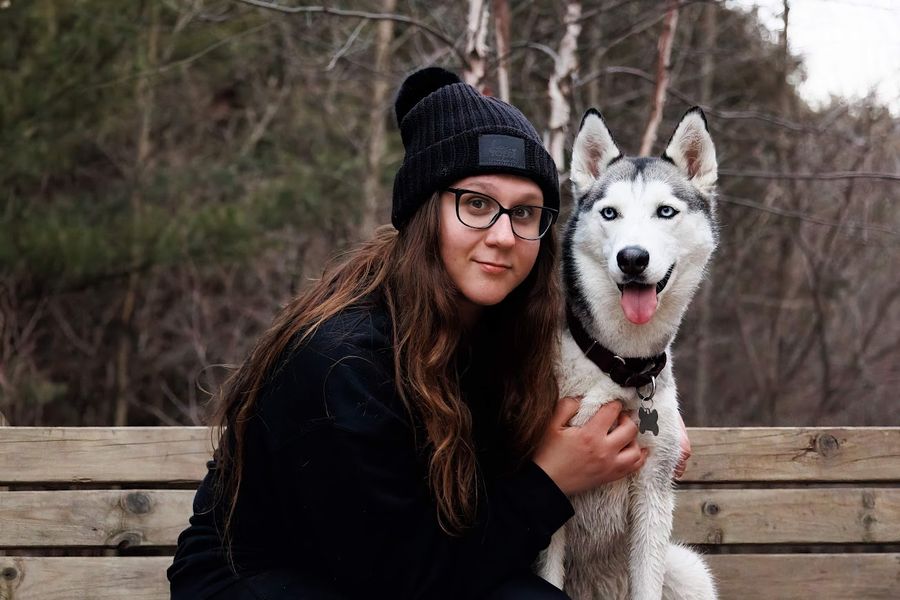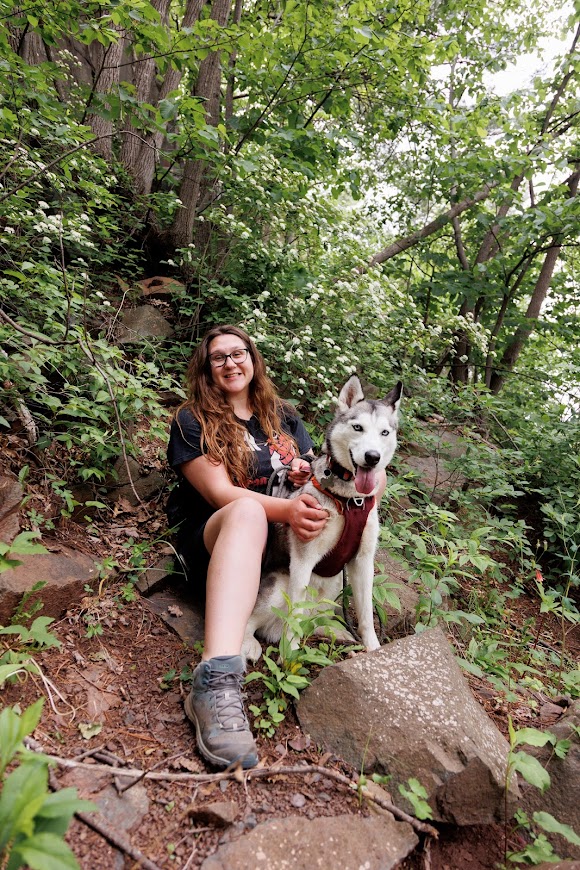March 14, 2023 - Sophia Barr hails from Boyd, a small town in Wisconsin, which has a population of between 500-600 folks, where she lived until age 18. In the following years, she relocated several times before settling in Minnesota when she was 24 years old.
She is the only Deaf person in her family. Her hearing loss was diagnosed when Sophia was three years old. “What’s wrong with her? Why is she not talking?” Her parents took her to an audiologist who confirmed that Sophia was deaf in her right ear, and had a moderate loss in the other year that gradually went away over the years. Growing up, Sophia used spoken English and Signing Exact English (SEE) to communicate. She had access to a sign language interpreter on-off during her educational years. Her small-town school lacked the resources needed to provide her with full access. Her family did learn some sign language “but they were more like home signs.”
She attended the University of Wisconsin at Milwaukee where she studied towards a GER as she wasn’t sure what to major in. At this time she also took ASL classes where she realized that there was a difference between ASL and SEE. “It was difficult for me to figure out the grammar, switching from SEE to ASL.” During that time, she studied abroad in London where she realized that she enjoyed traveling and that made her decide to transfer schools to University of Wisconsin-Stout. There, Sophia got a bachelor’s degree in Hotel, Restaurant, and Tourism Management. Upon graduation, she moved to Minnesota. “I realized that Minnesota had a thriving Deaf community, and through involvement with the local Deaf and hard of hearing community, my signing skills picked up.” Through exposure and full access to sign language, she finally got the feeling of being included.
Sophia struggled to find employment in her field of tourism. She eventually found work with a group home. While working at the group home, she decided to pursue higher education, where she returned to UW-Stout for graduate study for a master's degree in Rehabilitation & Counseling. She has one more year until completing her degree.
She currently works two jobs; a part-time job with Minnesota Hands & Voices, a nonprofit organization that serves families with unbiased resources and where families can connect with other families that have children with hearing loss. She is an administrative assistant and also serves as a Deaf and Hard of Hearing Guide. As an administrative assistant, she handles the social media and advertising platforms, and projects assigned to her by her boss. As a Guide, she meets with families of a deaf or hard of hearing child who are interested in learning from the perspective of a Deaf or hard of hearing adult mentor. “We meet with the families and share our experiences growing up and do not share biased information. Instead, we share our own experiences - this is what I did in that situation, that is what I did for that educational experience.” She also works full-time with medical and airplane engines. As a third shift, she works as a quality inspector, inspecting the different parts of machines and determining if they pass quality control tests before sending them to companies for assembly.
Sophia shares her love for working with MN Hands & Voices, citing the warm office atmosphere and enjoying working as an administrative assistant. She also enjoys being able to work from home as well. Being part of the MN Hands & Voices gives her the opportunity to be actively engaged with the Deaf and hard of hearing community. She also enjoys the travel perk of crisscrossing across the state of Minnesota to meet with families and the community. She was pleasantly surprised to find her secondary job with quality assurance to be an inclusive environment. “I’m so used to hearing folks who make it awkward for both of us, not sure what to do with the other person. I didn’t feel that way here.” She points out their willingness to honor her needs for access and work with her to make it happen. “There’s another Deaf employee, and it’s nice not being the only Deaf employee - they’ve already worked with one and know what to do in terms of access accommodations, and they’ve made it work for me.”
Regarding challenges at work, Sophia shares that MN Hands & Voice already has a Deaf-centric approach with staff and the community, so there are minimal barriers that she faces there. With the machinery work, she points out the noisy environment that can make verbal communication difficult at times. She also shares a story about a certain machinery that uses a vacuum and has a high-pitched noise to it. Her hearing coworkers would tell her “Stop, that’s really loud! And I’m like, I’m deaf, I can’t hear that?” She shares how fortunate she is to have little to no barriers at both jobs.
Sophia shares the following advice for employment: “Don’t be afraid. Tell them upfront what you need in terms of access accommodations. Don’t be hesitant about it, just tell them what you need, regardless of how difficult or expensive it can be for them to make it happen. If you are qualified for the job, and they hire you and want to keep you, they will work with you to make your work environment accessible. Be your own advocate. Don’t take ‘no’ as an answer.”
When she’s not working, Sophia loves to travel and go for hikes with her dog, baking, and hanging out with friends and family. She has picked up reading for fun again, and particularly enjoys thriller stories. “Oh and drinking coffee. That’s a hobby too!”
She shares some parting thoughts: “It’s never too late to advocate for yourself. Start as early as you can - I made that mistake in high school and did not utilize resources that were available for me to use. I didn't advocate for myself or my needs. I struggled because of that, and now I’ve learned to be my own advocate to get what I need. I know it can be scary sometimes, but you have people around you who will support you. They will encourage you. You’re not alone.”
The #CanDoAnything campaign showcases people who are deaf, deafblind, or hard of hearing at work, giving them an opportunity to share what they do at their jobs and explain how communication access works for them. This campaign shows what our community can do, which is anything!

